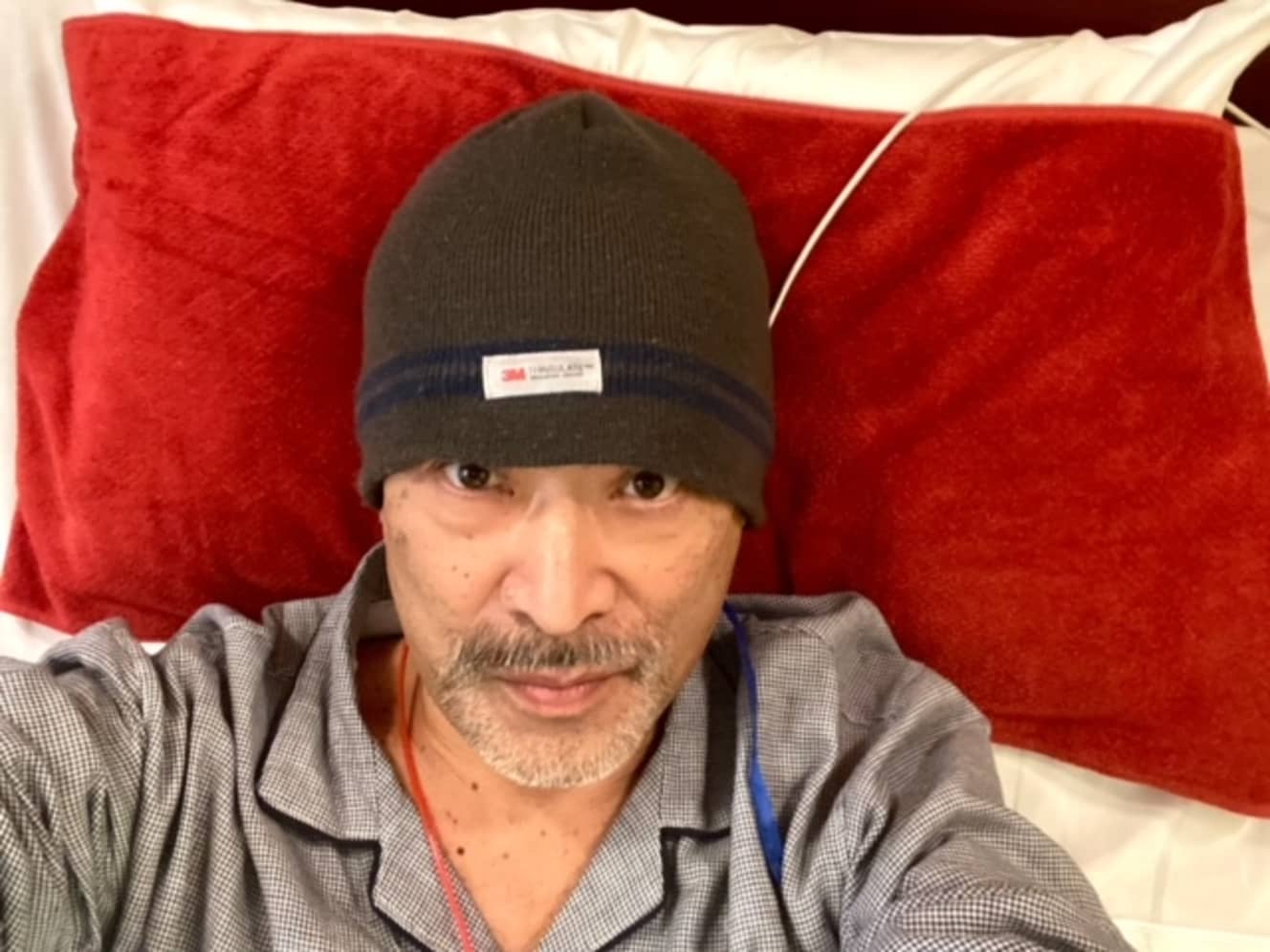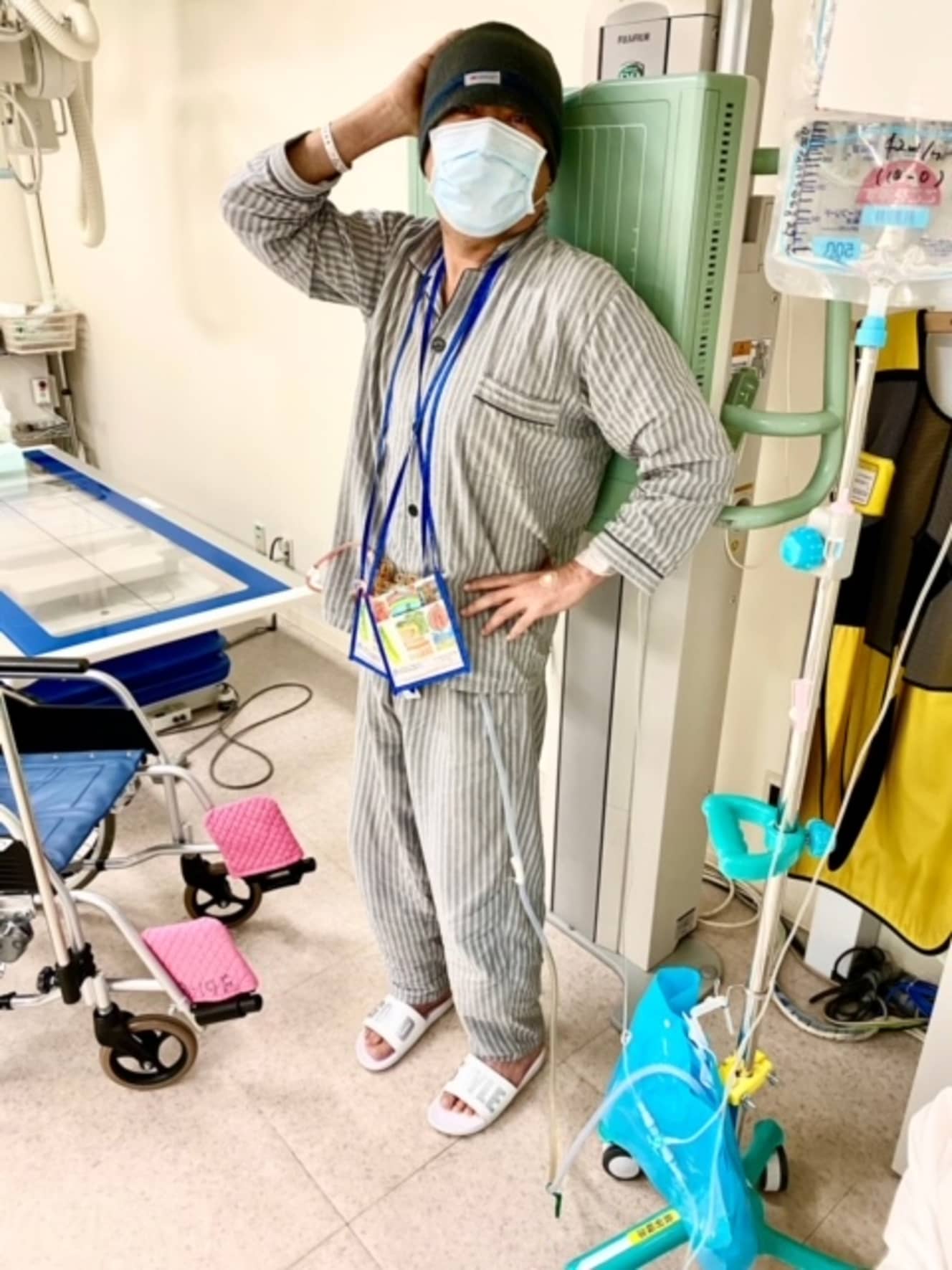Nobuyoshi “Kwaman” Kuwano Overcame Hell from Anti-Cancer drugs

Nobuyoshi Kuwano, 65, continues to be active as a trumpeter in “Rats & Star,” a pioneering Japanese R&B singer. Since his debut, he has been drinking heavily after every live performance.
“I often ate stimulants and fatty foods. My rhythm of life was very disorganized. I was drinking so badly that people who couldn’t stand to watch me would sometimes warn me, saying, “You’re drinking too much.” But I would say, “Shut up! It’s my life, I’m responsible for it! I was so excited. The day after I drank a lot, I often had diarrhea and sometimes constipation. But I never thought I was sick at all.”
About two or three years before the discovery of his colorectal cancer, he began to check the location of the nearest restroom to his dressing room first thing when he arrived at a concert venue.
“I’d have a bowel movement and go to the bathroom, but I’d only get a little bit of stool that looked like a colicky rabbit turd. Then I would suddenly have diarrhea. Sometimes my bowel movements were so urgent that I couldn’t make it to the bathroom in time, so I had to make sure I knew where the bathroom was first or I would get restless.”
Still, he falsely attributed his bowel movements to alcohol. One day, he had a bloody stool.
“I always hated hospitals and was reluctant to undergo physicals. So when I had bloody stools, I just assumed it was “hemorrhoids,” he said. But those days didn’t last long. I began to feel dizzy and thought, This is indeed strange. My family said, ‘Please, please, go to the hospital!’ So I finally went to the hospital.”
Encouraged by his family, he underwent his first colonoscopy at the age of 63.
“I was surprised at how quickly the endoscopy was done and how painless it was. I thought, ‘If this is what it’s going to be like, I should have had it done earlier. At that time, two polyps were found. My doctor said, Next time, we will remove the polyps. There is one polyp that cannot be removed by endoscopy. He informed me that I had colon cancer.”
The doctor showed me an image of the colon and said, “You have stage 3b colon cancer (rectal cancer) and will need surgery.” The rectum is a part of the large intestine near the anus, and because the tumor was blocking the passage of stool, I was having colonized stools that looked like rabbit droppings. When I heard that I was going to have surgery, I said, “It’s okay, it’s not too late now, is it?” But his doctor did not shake his head. Instead, he said, “I’ll do my best.” That was the first time I realized how serious the situation was.
The family was notified of colorectal cancer together. Kuwano could not hide his shock at hearing the doctor’s words, but his family smiled and said, “We’ve come this far, and we have no choice but to fight! Medical science has advanced, and you will be fine!”
“The family must have smiled to cheer me up. I think that made me determined to fight and not give in to cancer.”

Stage 3b is when cancer cells have invaded deeper than the muscle layer and metastasized to the lymph nodes. To reduce the size of the tumor as much as possible he was administered anticancer drugs before the surgery.
“I was given four courses of anticancer drugs, the first of which caused no side effects at all. I even ate a bowl of katsudon (pork cutlet on rice) after the administration of the anticancer drug. However, I collapsed the next day, which made me realize how scary anticancer drugs are. Even so, I managed to finish the four courses and the tumor became smaller, so I underwent a robotic surgery called “da Vinci.”
The 14-hour surgery was a success. However, many challenges awaited him after the surgery. After the tumor was removed and the intestines were stitched together, a stoma (artificial anus) was created for several months to prevent the risk of suture failure. Once it is confirmed that there is no suture failure, the stoma is removed and the patient undergoes surgery to allow excretion through the original anus, but in some cases, depending on the location of the tumor, the patient may wear a stoma for the rest of his life after surgery. In Kuwano’s case, he did not know before the surgery which would be the case.
His doctor told him, “Unless you have the surgery, you won’t know if you will have a stoma for the rest of your life or not. If the stoma is on the left side after the surgery, it will be for life, but if it is on the right side, it will be temporary.” So when he woke up from anesthesia, the first thing he did was to check and uttered, “Thank God!”
But while he was happy that his stoma was temporary, the first two weeks after the surgery were marked by suffering that he had never experienced before. In addition to the intravenous drip, his body was connected to several tubes, and he could not move at all. Kuwano recalls that it was a “living hell,” but at the same time he prayed to God, ” Please spare my life, because I am going through a living hell!”
Perhaps his prayers were answered, and he was discharged from the hospital in two and a half weeks. After the surgery, his stoma was temporary. But after spending three months with it, he think that it would not be a problem even if he had it for the rest of his life. “I never once leaked, and I was an honor student. The stoma can be covered, and there are many different designs. I was having fun with it and became attached to my stoma, thinking about using the cover from the comic book “Oni no Kenshu no Kai” (Blade of the Demon).”
After leaving the hospital, he began anticancer treatment to prevent recurrence, with the goal of participating in the “Rats & Stars” tour.
“I had managed to tolerate the preoperative anticancer treatment, so I thought I would be fine after the surgery, too. However, the side effects were terrible. I couldn’t move my body. The nausea was also great. I was moaning all night long, holding the toilet in my arms, and it was mentally overwhelming. I thought, ‘If I don’t do something, the anticancer drug will kill me.”
The side effects were so severe that he even suspended his blog for a while. When he consulted his doctor about stopping the anticancer drugs, he was told, “There is no guarantee that the anticancer drugs will not cause a recurrence. It is Kuwano who decides. However, you will have to remove the stoma when the anticancer drug is finished.”
“When the anticancer drug administration was stopped and the stoma was removed, I had trouble defecating. My doctor had told me in advance, so I was determined to put it back on in a week. I was determined to get back on track, but I had 60 bowel movements in 1 day. And even if I don’t have a bowel movement, I still have to go out. I started wearing adult diapers because I couldn’t make it to the bathroom in time. It was a blow to my self-esteem and I felt insecure about having to have a bowel movement even though I was wearing a diaper. Would they smell the stool? There was a time when I avoided meeting people because I was worried about the smell of the stools.
 Cancer was the kick-start for him to improve his lifestyle. I just got back to my normal shape (laughs).
Cancer was the kick-start for him to improve his lifestyle. I just got back to my normal shape (laughs).He says, “After I started talking about diapers on my blog and at live performances, I gradually became less resistant to them. I tried various diapers, found my favorite brand, and now I go to the pharmacy to buy diapers by myself. Some people get rid of defecation problems quickly, while others have them for a long time. And in my case, I don’t know what will happen in the future. Still, you know, I’m getting used to my defecation disorder these days and I’m getting better at controlling it. On days when I have to go on stage or work, I don’t eat from the day before. Then I don’t have anything to go out, so I don’t have bowel movements!”
On April 28, he published a book titled “Ganbaranai Ikikata (How to live without trying hard): The secret of smiling after getting colorectal cancer” (KADOKAWA). In the book, he writes about his honest feelings during his battle with colorectal cancer and the details of his treatment.
“I am grateful to be alive and want to repay those who have supported me. For a while after I was diagnosed with colorectal cancer, I didn’t want to admit that I had the disease, so I dared to stay away from information about colorectal cancer. But along the way, I started reading various people’s cancer stories and blogs. Now I am a search maniac. I immediately look things up and refer to them. When I felt anxious, other people’s experiences were very helpful. It helped me. I hope my experience will be helpful to others, too.”
When he underwent surgery last February, he was encouraged to participate in the tour starting in April of the same year. However, he did not regain enough strength to participate in the tour, and at one point he felt depressed. However, Masayuki Suzuki (65), the leader of the group, told him, “I’m starting the tour first, so you can take your time to heal so that you can return to the stage in July,” to which he replied, “Okay! I’m definitely going to be on stage in July!” True to his word, he was able to perform in Osaka on his 40th anniversary tour.
“Thanks to my colorectal cancer, I was able to quit drinking and smoking. I also reviewed my diet to strengthen my immune system and prevent recurrence. I also became aware of intestinal activities. Warming up the body activates the immune system, so I make it a habit to drink plain water first thing in the morning, then eat black vinegar, red vinegar, and black garlic. For breakfast, I have a smoothie, brown rice flakes, and soy milk. Thanks to this, my cholesterol levels have normalized and my diabetes has improved. People I haven’t seen in a long time say, I’ve lost weight! but it’s not true. I’m just back to my original healthy body. Now that one year has passed since the surgery, I want to live every day with joy and laughter so that I can be in remission (no recurrence for five years).

Interview and text by: Eri Yoshizawa
Pharmacist and medical journalist